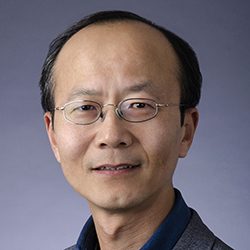People
Co-Directors

Margaret ROBERTS
Margaret ROBERTS is an associate professor of political science at UC San Diego. She studies political methodology and the politics of information, with a specific focus on the methods of automated content analysis and politics of censorship in China. She uses large, online datasets to reverse-engineer the content of censorship and online propaganda in China and estimate its impact on citizens’ access to information. Currently, she is working on projects that span censorship, propaganda, topic models, and other methods of text analysis. Roberts received a PhD from Harvard University in 2014 and an MS in statistics from Stanford University in 2009.

Ruixue JIA
Ruixue JIA, an assistant professor of economics at the School of Global Policy & Strategy at UC San Diego, is interested is the interplay of economics, history, and politics. One stream of her research focuses on understanding elite formation and elite influence in both historical and modern contexts. She has published research on how open access to elite status matters for political stability and has studied how competence and loyalty jointly determine who becomes a top politician in China. A second research stream is on the evolution and impact of social norms. A third is the deep historical roots of economic development. She has published on the long-term impact of the ‘treaty ports’ system and the determinants of peasant rebellion.
Researchers

Tai Ming CHEUNG
Tai Ming CHEUNG is a professor at the School of Global Policy and Strategy at UC San Diego and director of the UC Institute on Global Conflict and Cooperation (IGCC). He is a longtime analyst of and leading expert on Chinese and East Asian defense and national security affairs, especially related to economic, industrial, technology and innovation issues. Cheung leads the IGCC project The Evolving Relationship Between Technology and National Security in China: Innovation, Defense Transformation, and China’s Place in the Global Technology Order. He also manages the institute’s Northeast Asia Cooperation Dialogue, bringing together senior foreign ministry, defense officials, and academics from around the globe.

Subhasis DASGUPTA
Subhasis DASGUPTA is a data and computation specialist at the San Diego Supercomputer Center at UC San Diego. He spent almost seven years in software research and development before coming to UC San Diego. Dasgupta was the first employee of Kaavo Inc., a cloud management startup. Before that, he worked at the Indian Statistical Institute, Jadavpur University Kolkata, DataInfoCom Inc., and the Marine Engineering Research Institute. He has been involved in large-scale computation and data processing using grids and clusters at different organizations. His research interests include databases, access control, big data, and query processing. He received his PhD from Jadavpur University, India.

Amarnath GUPTA
Amarnath GUPTA is currently a full research scientist at the San Diego Supercomputer Center at UC San Diego and directs the Advanced Query Processing Lab. His primary areas of research include semantic information integration, large-scale graph databases, ontology management, event data management, and query processing techniques. Before joining UC San Diego, he was the chief scientist at Virage, Inc., a startup company in multimedia information systems. Gupta has authored more than 100 papers and a book on event modeling, holds 13 patents, and is a recipient of the 2011 ACM Distinguished Scientist award. He received his PhD in computer science from Jadavpur University in India.

Kai LIN
Kai LIN is a senior research programmer at the San Diego Supercomputer Center. Lin’s current research interests include databases, data management, cyberinfrastructure, geoinformatics, and software engineering. He has a PhD in computer science from UC San Diego.

Barry NAUGHTON
Barry NAUGHTON is the Sokwanlok Chair of Chinese International Affairs at the School of Global Policy & Strategy at UC San Diego. Naughton’s work on the Chinese economy focuses on market transition, industry and technology, foreign trade, and political economy. His first book, Growing Out of the Plan, won the Ohira Prize in 1996, and a new edition of his popular textbook, The Chinese Economy: Adaptation and Growth, appeared in 2018. Naughton received his PhD in economics from Yale University in 1986.

Kwai NG
Kwai NG is a professor of sociology at UC San Diego. His research interests are sociology of law, legal language, and social theory. He has conducted field research on the grassroots courts in China and the bilingual courtrooms in Hong Kong. Ng’s book on the Chinese courts, Embedded Courts: Judicial Decision-Making in China, with Xin He, was published by Cambridge in 2017. He received his PhD and MA in sociology from the University of Chicago and his BS in journalism from the Chinese University of Hong Kong.

Weiyi SHI
Weiyi SHI is an assistant professor of political science at the School of Global Policy & Strategy at UC San Diego. Shi received her PhD in political science at UC San Diego. Her dissertation was on the political economy of China’s outward direct investment, where she investigated how the delegation of state objectives to firms influences the behavior of Chinese investors and China’s foreign policy. Her ongoing collaboration with Tsinghua University and China Council for the Promotion of International Trade produces an annual firm-level survey that assesses key indicators of Chinese firms’ internationalization and business environments in China and abroad.

Victor SHIH
Victor SHIH, a scholar of the political economy of China, is an associate professor at the School of Global Policy and Strategy at UC San Diego. He has published widely on the politics of Chinese banking policies, fiscal policies, and exchange rates, and was the first analyst to identify the risk of massive local government debt. Shih is currently engaged in a study of how the coalition-formation strategies of the founding leaders had a profound impact on the evolution of the Chinese Communist Party. He is also constructing a large database on biographical information of elites in China to better understand the importance of networks in political decision making. Shih holds a PhD in government from Harvard University.

Yang (Young) YANG
Yang (Young) YANG is a research data analyst at the China Data Lab, where he manages the center’s databases, consults with faculty about data-related projects and crafts our data visualization blogs. His research interests fall into how new information technologies combined with government and platform policies influence individuals’ and organizations’ decision-making processes. He received his Ph.D. from the School of Management at Zhejiang University and was a research scientist at Yale School of Public Health, working on research on smart health and medical reforms in China.

Yiqing XU
Yiqing XU is an assistant professor of political science at Stanford University, studying political methodology and comparative politics, focusing on China. He received a PhD in political science from the Massachusetts Institute of Technology (2016), a master’s degree in economics from Peking University (2010), and a bachelor’s degree in economics (2007) from Fudan University. He won the American Journal of Political Science Best Paper Award for 2016 and the Miller Prize for the best work appearing in Political Analysis in 2017. He is working on a series of projects related to causal inference with panel data, Chinese ideology, and career tracks of Chinese officials.
Administrators

Lei GUANG
Lei GUANG is director of the 21st Century China Center at the School of Global Policy & Strategy at UC San Diego and a professor of political science at San Diego State University. His research focuses on state-society relations and development politics. He has studied migration, informal sector workers, and political discourses in China and is currently working on projects that seek to understand the causes of social conflict in China and responses by the grassroots state. His scholarly publications have appeared in numerous edited volumes and in refereed journals, and he is an editorial board member of China Quarterly and the China Journal. Guang has a PhD in political science from the University of Minnesota.

Susan SHIRK
Susan SHIRK is a research professor and chair of the 21st Century China Center at the School of Global Policy & Strategy at UC San Diego. She is one of the most influential experts working on U.S.-China relations and Chinese politics. Shirk’s book China: Fragile Superpower helped frame the policy debate on China in the United States and other countries. Shirk previously served as deputy assistant secretary of state (1997-2000), responsible for U.S. policy toward China, Taiwan, Hong Kong, and Mongolia. She founded and continues to lead the Northeast Asia Cooperation Dialogue, an unofficial forum for discussions of security issues.
Student Researchers
Ye WANG, School of Global Policy & Strategy • Chuncheng LIU, Sociology • D.G. Kim, Political Science • Sichen LI, Political Science • Keng-Chi CHANG, Political Science • Chen SHEN, School of Global Policy & Strategy • Brian ENGELSMA, Political Science • Geoff HOFFMAN, Political Science • Haoshen HONG, SDSC • Rebecca HU, Data Science • Patrick HULME, Political Science • Jiying JIANG, Political Science • Jonghyuk LEE, Political Science • Jingheng LI, Political Science • Kevin LI, Political Science • Jingwen LIU, School of Global Policy & Strategy • Minsheng LIU, Political Science • Luke SANFORD, Political Science • Haoran SUN, SDSC • Duy TRINH, Political Science • Joseph Yu WANG, Sociology • Qixue WANG, School of Global Policy & Strategy • Yingtao XIE, School of Global Policy & Strategy • Shane XUAN, Political Science • Eddie YANG, Political Science • Leo YANG, Political Science • Yin YUAN, Political Science • Jiannan ZHAO, Political Science




